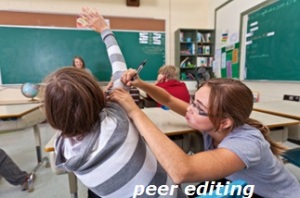 Movie director Ron Howard, in his film Parenthood, seats Steve Martin and Mary Steenbergen in front of a dour elementary school Principal. She lands the first blow. “We don’t think Kevin should come back here next Fall. I’m going to recommend that he be transferred to a school that offers special education classes.”
Movie director Ron Howard, in his film Parenthood, seats Steve Martin and Mary Steenbergen in front of a dour elementary school Principal. She lands the first blow. “We don’t think Kevin should come back here next Fall. I’m going to recommend that he be transferred to a school that offers special education classes.”
Dad risks a guess. “Because he’s so smart?” (Don’t rule it out.) “Well, actually, I mean a class for children with emotional problems,” the Principal continues. (Seems Kevin’s been pretty anxious.) In breezes an unwelcome surprise guest: one “Dr. Lucas” who should NOT be introducing himself at THIS stage. But here he is. Ron Howard is crafting very bad psychologist indeed. He has “been observing Kevin for the past couple of months.” (REALLY?)
CUT! Who hired these Un-Professionals? Yes, Hollywood DOES have license to show them as seen through these poor parents’ glazed eyes. But Ron!
WHERE did you get such ethically bankrupt and autocratically insensitive educators? (Not to mention, badly dressed.)
WHY are you trading on our anxieties about special ed, just for a bit of plot-thickening?
HOW can any psychologist, anywhere, get to observe and assess child without even asking the parents AND make a placement recommendation that looks pretty final?
MOREOVER: On its own, anxiety is the LAST reason to make the little guy change schools, Ron. It’s a great reason to keep him right where he is. Special educators know this. Staff who are familiar to Kevin seek School Psychology consultation. They then support his school adjustment (storeys B & C at right). This in turn supports his achievement (Storey A at right).
Tough on Parents? Needlessly, in this case. “Mr. Buckman, this is a public school” adds the Principal. (Really? Why is it just now feeling like a back office of the Mob?) At its best, but admittedly not everywhere, modern special education can be so inspiring that parents fight to get their kids into it. Evidence-based teaching practices are the mainstay. Assistive technologies such as laptops loaded with specialized software, SmartBoards (touch-screen whiteboards) and math apps that let you lay out equations textbook-style, edit and and graph them; are examples of cutting-edge accommodations that help level the playing field for students with unusual profiles.
Flexible, Powerful Teaching and Learning Strategies. Ontario students are among the more fortunate, participating in this deep cultural shift. This movement began with UNESCO’s 1990 Declaration on Education for All. Best practices are not always expensive. Even developing countries get more for each education dollar
Look for a school culture that is strongly inclusive.
Two basics apply here. First, instil in students the shared goal of success for all. Second, proactively build cohesion and problem-solving BEFORE the inevitable bullying emerges. Restorative Practices, based on Native justice circles, is perhaps the best example.
Where does that leave competition in the classroom? Lost in the past. Sympathies to all parents who ever dreamed that their child would be clapped and cheered by classmates for beating them all. Success is its own reward. Rare is the teacher who is still stuck in the competition era. They have long ago lost touch with the system’s growth in values. Yes, there MUST always be scholarships and medals. Healthy schools save for those triumphs for commencement; and Most Improved Student is among them.
What does special education really look like today? The answers are as diverse as students’ needs. From sensitive and brilliant individual programming for the child with autism; to the high-octane stimulation and support offered by a best-practices Gifted teacher. In every profession there are inequalities in expertise. But specialist teachers are a highly motivated crew and their upgrading is continual.
So, why do many of us, as parents, still fear even something as mild as a diagnosis of Learning Disability or Attention Deficit Disorder?
We presume that labels limit our child’s academic future and career. This is upside down, since rights and advocacy have taken hold. Marks are all that the School Board can transmit to post-secondary institutions. But those institutions now have their own learning support systems. You are admitted on your merits, THEN you send your diagnosis and apply for Accessibility (Learning Strategist; Assistive Technologies; accommodations).
If stigma makes us maroon the students’ broader abilities by not meeting specific functional learning needs, then we DO limit their futures. Even school behaviour issues, a parent’s worst nightmare, respond to sophisticated best practices. So how do we get our heads around the key issues, ask the right questions and make the right moves on our kids’ behalf?
Ask for the big picture. Educators and administrators are often careful to not overwhelm us with information beyond the immediate scenario. If you give them permission to explain the broader prospects and options, often you will usually get an enthusiastic response. “Response to Intervention” (RTI) is now the first-line approach. In early grades, we have better and better remedial methods that serve a preventative role. (A best-case example is the Empower Reading program developed at Hospital for Sick Children.) RTI is special education, writ-small. If it helps, but not enough, then we look at more formal psychological assessment; toward identification as an Exceptional Learner.
Listen to your child without bias. Their school experience will come across differently to you, as parent, versus what they say to an educator. Don’t expect them to be necessarily consistent. Most kids don’t know how to express inner conflict until adolescence or close-on. In time, they will to learn to say, “Part of me thinks essay conferencing is working; and part of me just thinks it’s too confusing.” (Maybe the’re not said to the same person, either.) Don’t confront them with their inconsistencies when they are first learning to resolve conflicting views even adults can struggle with.
Understand the Four Levels of Growth. One way to quickly grasp a child’s needs for special education is to ask questions based on the four-level graphic alongside this article.
Achievement;
Behaviour;
Clinical concerns versus emotional health; and
Development (physical, motoric, cognitive, language . . . )
form a necessary self-supporting structure, similar to the fancifully tall four-storey school building pictured above. (The image here is of very limited resolution. A fully detailed version is available from the author: psychologyisgrowth@live.ca .) Practitioners of school psychology can tell you which levels are involved; and what the next steps are, at each storey.
Get involved. Anything you can do for your child’s school tends to be received with true gratitude; and helps build collaboration. Parent involvement is such a priority that it is one focus of recent amendments to the Education Act (Bill 177; Sept. 2010).
Support your child’s self-concept. We may come to laugh at stigma but for adolescents it is rarely a laughing matter. All bets are off, for how teen peer groups will respond to a student’s Identified status. Your teen’s self- advocacy may just have to wait until post-secondary years. Privacy of his or her identification is impossible to maintain. Ironically, attempts at privacy would just fuel stigma. Celebrate strengths and recognize needs. Everyone else can ‘get over it.’
Know your rights. Educators in general are highly respectful of them. While it is possible to approve some parts of a recommended programming but not others, DO be careful that you don’t block your child’s broader options by disagreeing with one essential piece. Be aware that special education ‘labels’ (identification categories) often sound worse than they are. “Communication; Learning Disabled” is often a sought-after category. In it, the child is understood to have Average potential or better; but MUST have special education to fulfill it, without undue agony.
In some boards, “Autism” is the only administrative label under which complex multiple needs get help; even if it is not the actual diagnosis.
Look farther afield. Interventions and supports from agencies like Learning Disabilities Association of Ontario, JVS Toronto, Canadian Attention Deficit Disorder Resource Alliance and private psychological services can each make a substantial difference. Special educators, psychologists and some psychology-savvy physicians can guide you to them.
Be aware:
Public educators can’t actually recommend private assessment–That creates an impression that the system is broken. Of course, the system is more cash-strapped than outright ‘broken.’
Like all public resources, it has to priorities the most urgent needs. Usually the most they can do is respond clearly, when you finally do ask about private psychology.
Include “Psychological Associates” when you search for private services. Many PA’s have extensive school board experience. They are fully independent practitioners and diagnosticians, with an MA rather than PhD. The College of Psychologists certifies and regulates both at the exact same level.
Attend all the meetings. There are three levels. (1) A SERT conference explains learning needs and offers options. You may want other professionals there, too. (2) IEP or Individual Education Plan. Rubber meets road. This document specifies concrete steps. Even your homework support can be more effective with IEP guidance. If diagnostics are recommended, results go to a Board committee called (3) IPRC. This provides legally binding recognition of rights to special education.
Focus on what’s possible. Funding levels and staff training spaces are not what administrators and specialists would wish. If you get frustrated, you can bet they are too. A dose of reality has to be swallowed every time an IPRC committee weighs a child’s needs against available placements and resources.
Take the long view until your child can. Even our teens have mostly minimal mind share for ‘the future.” Tossing around the possibilities for program choices briefly but often is a growth experience for them. School Guidance is really only the second level, built on top of the thoughtfulness that parents instil about this, from day to day.
Be politically aware. Many Canadian provinces pushe the special-education envelope, whenever they can. American legislation may be ahead of ours on paper, but our overall resources-in-place are probably ahead of most U.S. jurisdictions. Some urban areas such as Toronto face special challenges due to complex demands on their education systems.
Finding out more:
The Ministry’s book-length PDF, Education for All, lays out recent best practices for core math and reading. Though written for educators in grades K-6, contains overview segments useful to parents. The follow-up, Learning for All addresses grades K-12. Autism publications include Effective Educational Practices for Students with Autism Spectrum Disorders. For attentional disorders and executive function, we are just at the outset of special education rights. CADDRA and CADDAC are twin organizations which seek to improve treatment and education for students with these highly workable conditions. While attentional disorders are not recognized by the Ministry as a cognitive learning disorder, they are the next frontier.
© 2012 Ken McCallion, Registered, MA CPsych Assoc










